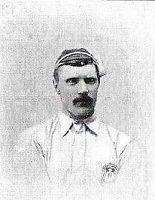Nichol Smith

Nichol Smith's life was to be a short one. Both he and and his wife would die within a fortnight and a half of each other of enteric fever, typhoid, leaving five young children, four boys and a girl. He was aged just thirty-one.
At the time the family was living on West Donnington St. in Darvel. It was the town, in which he had been born on Christmas Day, 1873, had lived all his life apart from the brief period in Uplawmoor by Neilston, his father being a policeman and therefore moved around, where in 1894 he would marry Anne Lochore and where all his five children had been born. Small wonder that he was nicknamed "The Darvel Marvel".
A powerfully-built, hard-tackling full-back "Nick" Smith's talent was apparent early. He had been captain of Scotland at junior level, was signed from local club Darvel by Rangers aged nineteen and would win the first of dozen caps at twenty-three. But he had started, like so many in his home-town, as a lace-weaver before professional football. But once in the Ibrox side he would make almost one hundred and seventy appearances over a decade and be in teams that took the Scottish Cup in his first season, plus twice more, be league champions for four successive seasons from 1899 and win Glasgow and Charity Cups and the Glasgow Exhibition Trophy in 1902. And there might have been a fifth league victory had he lived. At the end of the 1904-5 season Celtic and Rangers finished on equal points with Celtic only taking the championship on a play-off.

Yet, despite his service for his Glasgow club and it arranging a good-sized trust fund for his children, who were brought up still in Darvel by their grandmother, Nichol Smith and his wife were buried in unmarked graves. As a result it has taken a considerable effort by in particular two supporters of the Rangers Restoration Project and more than a century to track down the location of the final resting-place. It is again in Darvel in the graveyard of the Old Church, where a simple, Rangers, commemorative-stone now marks the spot.
However, for at least some of those intervening years there was a more tangible legacy. Smith's second son James, Jimmy, would immediately after The Great War also join Rangers, again from junior football and as a full-back. And, whilst there over three seasons he would make fewer than a score of appearances, on transfer in 1922 to Aberdeen he would convert to left-wing and in the Granite City over just short of a decade play three hundred games.
Birth Locator:
Residence Locations:
1881 - Uplawmoor, Neilston, Renfrewshire
1891 - 8, Burnbank Street, Darvel
1894 - Burnbank Street, Darvel
1901 - West Donington St., Darvel
1905 - West Donington St., Darvel
Death Locator:
1905 - Kilmarnock Infirmary, Portland St., Kilmarnock
Burial Locator:
Other Locations:
Rangers F.C., Ibrox Stadium, Glasgow
Back to the Loudoun Trail
or the SFHG Home page
© Copyright 2022-2025. All rights reserved/Todos los derechos reservados.
Any use of material created by the SFHG for this web-site will be subject to an agreed donation or donations to an SFHG appeal/Cualquier uso del material creado por SFHG para este sitio web estará sujeto a una donación acordada o donaciones a una apelación de SFHG.
We need your consent to load the translations
We use a third-party service to translate the website content that may collect data about your activity. Please review the details in the privacy policy and accept the service to view the translations.
